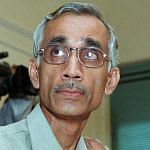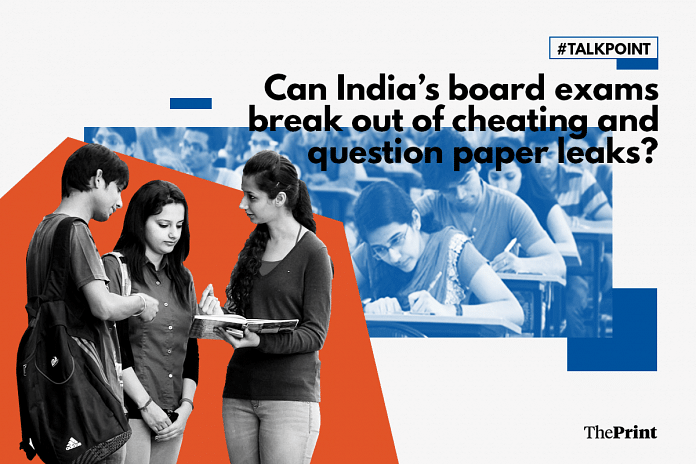On Wednesday, the CBSE announced it would be conducting a re-examination for Class X maths and Class XII economics after the question papers were leaked. Some students are now demanding that a re-examination be conducted for all the subjects.
ThePrint asks: Can India’s board exams break out of cheating and question paper leaks?
CBSE paper leak shows we need to revisit how papers are distributed, collected and stored

Ashok Ganguly
Former CBSE chairperson
There is a saying that is very relevant in this context — nothing fails like success. The CBSE conducted board examinations impeccably for decades. But such success brings with it complacency, negligence and arrogance. I have a hunch that faith in the infallibility of the system led to this unfortunate situation.
We cannot do away with board examinations at this point in time. There is no alternative to it.
The CBSE is a national board. It is in a unique position to craft syllabi and conduct examinations across the country and abroad. It can’t be equated with a state board. We pioneered the move to introduce multiple sets of question papers. However, they did away with multiple question papers in this session. If they hadn’t, the impact would not have been so far-reaching. We could have avoided a situation where pan-India exams have to be re-conducted.
The CBSE exams are an offline system, which means that there is usually the complicity of an insider in leaks. By insider, I do not mean the CBSE staff. There many other people who are involved in printing the papers, distributing them, collecting them, and even storing them. Although the CBSE does try to institute a system of multiple checks and balances, there is always room for variability.
CBSE has a good system of checking unfair practices and cheating in the examination. By having different sets of question papers in the same examination room, it checks the mass copying and unfair practices in the examination. By doing away with multiple set of question papers, there is apprehension that cheating and unfair practices may flourish in the examination.
We need to revisit how examination papers are distributed, collected and stored. Weeding out chinks in the chain is necessary.
CBSE is unable to improve itself because of its bureaucratic structure and ethos
 Krishna Kumar
Krishna Kumar
Former director, National Council of Educational Research and Training (NCERT)
My answer to this question is: Of course it can. Exams are conducted by the boards, so any improvement in the conduct of exams depends on reform in the boards. Let us start by asking why some boards are better than others? The answer is simple: Boards that want to bring about improvements and have the resources to pursue a reform agenda do so.
The National Curriculum Framework, 2005, gave several basic recommendations for reforming the secondary-level exam system. These are elaborated in the position paper titled ‘examination reforms’, prepared by a national focus group that had among its members the chairpersons of several boards, including the CBSE. You can ask why the CBSE didn’t implement these recommendations. The answer is: It tried for some time, then gave up. To sustain any effort of this nature, you need institutional continuity, cohesion among different institutions, and openness to ideas.
One reason why the CBSE is unable to improve itself is its bureaucratic structure and ethos. Also, it carries an unwarranted burden of numerous exams and entrance tests, in addition to the the secondary-level exams, i.e. Class X and XII, that it was set up to conduct. Its inner world is quite opaque, so the chances of any real introspection are bleak.
We must remove the hype around the board exams, reduce stress and the race for 100s
 Divya Bhatia
Divya Bhatia
Principal, Amity International School, Saket
The events of the last few days, related to the leak of CBSE board papers, is a matter of disgrace for the entire nation, notwithstanding the anguish and anxiety caused to millions of young students and their parents.
Where is the credibility of our system when exams of such a stature are mired with controversies? This has shaken our faith in the system and requires detailed introspection by the CBSE and all the stakeholders to plug such loopholes in the future. Media debates are turning the issue into a political mud-slinging match. Since the future of our youth is at stake, it is time to join hands and work out solutions instead.
This year, for the first time, the CBSE had a common paper. Earlier, leaks affected only students of the state where they occurred. This year, the crisis is magnified because everybody is affected.
Tuition and coaching centres have a huge role to play in disseminating the papers. They need to be taken to task as well.
Each year, the CBSE has a set of experts frame questions, and compilers make the various sets of papers. Here is another possible way to do this —have a large bank of questions of varying difficulty levels, a marking scheme, and software that uses these to frame papers, which, in turn, are accessed by schools with a secret code and printed just 30 minutes before the exam. However, I am not sure how this would work for remote areas.
To mitigate the impact of leaks, we could also have all states conduct completely different exams with moderation done to bring students on a par with each other.
We need to take strict action against the miscreants by giving them exemplary punishment. And more importantly, restore the value of integrity among our students, parents and educationists, and the credibility of the system.
But, above all, we need to remove the hype around the board exams, reduce stress, and the race for 100s.
The advancement in technology has made cheating like the CBSE paper leak easier
 Basanti Roy
Basanti Roy
Former Mumbai divisional secretary, Maharashtra State Board
This is a very rare example. The boards are taking adequate measures, but cheating has become easier because of technological advances. For example, WhatsApp has made it easier to circulate leaked papers. And this could be one of the reasons why copying is difficult to curb.
Sensitisation of people is important to make exams cheating-proof. Furthermore, there should be stricter penal action against those who cheat and use unfair means, which currently gets a student debarred from appearing for board exams for three years.
Copying happens at two levels. At the level of people involved in conducting the exams (black sheep), and in exam halls during the course of the exam. The invigilators are not doing their job properly, and thus indirectly encouraging copying.
The number of CBSE schools has also gone up. Today, any Tom, Dick or Harry can open a CBSE school. The promoters of such schools adopt leaks and other dubious measures to attract people to their schools. Every street has a CBSE school today.
More than 17 lakh students appear for the CBSE exams now. With such a huge number of examinees, things are not manageable for one board. They are not able to implement strict discipline proportionately.
But there is no scope of corruption in this paper leak as the board is very vigilant.
The CBSE paper leak points to the need for a technological reboot in the process
 Anubhuti Vishnoi
Anubhuti Vishnoi
Deputy Editor
While lakhs of students and their parents are understandably distressed over the cancellation of two CBSE exams, trashing the CBSE as an institution beleaguered with exam leaks is excessive.
The CBSE has grown to become the most credible of this country’s school examination systems, and is looked up to for the quality benchmarks it sets. That a number of schools from various parts of the country continue to seek affiliation to this central government-backed board is a testament to the institution it has developed into and the prestige it enjoys.
The leak of the exam papers is an obvious pointer to the need for a technological reboot in the entire process of setting up question papers and conducting the exam. That the board needs to address this on top priority cannot be overemphasised.
There is, however, another equally significant aspect to the question paper leak, the retest and the agony it has brought to students and their parents.
It is about exam pressure and how much is predicated on this one end-of-the-year exam. The very possibility of having to re-appear for the board exam is enough to throw countless students into deep distress.
It is the debate about the academic rigour that the Indian schooling system brings and how it can suddenly teeter dangerously into life-and-death scenarios for a number of students. That was also the debate that turned political when one government made the Class X board exam optional and another brought it back.
The question paper leak sharply exposes the need for an overhaul and the need for a good hard look at what a nail-biting year-end exam does to every child in school.
Compiled by Deeksha Bhardwaj and Talha Ashraf, journalist at ThePrint.




News reports about papers leak for MathX and Economics XII in CBSE has reportedly upset several lacs students across country on 27 March , 2018. The papers are being redone while leakage is being investigated by Delhi Police. But the leak has reportedly affected several lacs of students plus their parents . Total of the affected persons could probably stretch to nearly a crore. The stress can be construed to be psychological as well. Relevant to the major concern described , it may be apt to bring here this Vedic astrology writer’s alert in hitherto well-known article – “ Astrologically speaking , some highlights for India in coming year 2018” – published at theindiapost.com , simultaneously at wionews.com on 19 October , 2017. The related text in the article covering Delhi also reads as :-
“ Mid-March to 31 May 2018. ……….Those involved in decision making or governance of big enterprises or big organizations or think tanks in the Govt , could be prone to errors or fault-lines or controversies giving rise to need for revision or amendment. The existing psychological cases may need upgraded expertise or there may be discernible increase in such like new cases during the year necessitating expansion of related infrastructure”. The alert would require to be read between the lines instead of taking its literal meaning. Obviously , it is closely implied referring to psychological or mental stress to a large number of persons during mid- March to 31 May 2018 in India following perceived error of those governing big enterprises. http://www.windowtonews.com/news.php?id=95576&cat_id=7&p=&search=